The Book Thief
 for some violence and intense depiction of thematic material.
for some violence and intense depiction of thematic material.
Reviewed by: Jennifer L. Hanley—first time reviewer
CONTRIBUTOR
| Moral Rating: | Average |
| Moviemaking Quality: |
|
| Primary Audience: | Teens Adults |
| Genre: | War Drama Adaptation |
| Length: | 2 hr. 11 min. |
| Year of Release: | 2013 |
| USA Release: |
October 3, 2013 (festival) November 8, 2013 (4 theaters) November 28, 2013 (wide—1,234 theaters) DVD: March 11, 2014 |
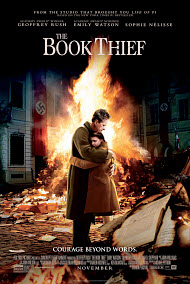

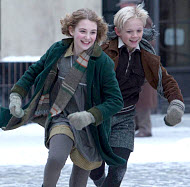
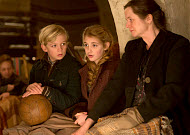
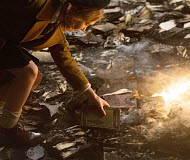
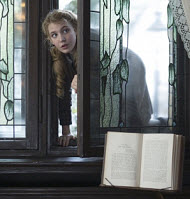
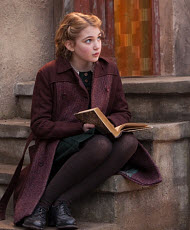
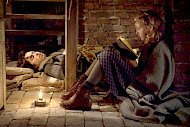
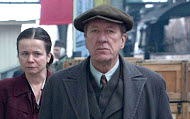
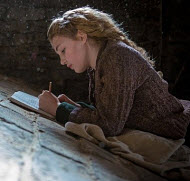
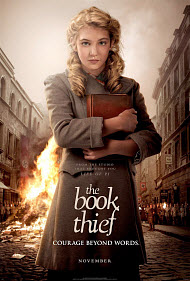

stealing in the Bible
courage, bravery, self-sacrifice
FEAR, Anxiety and Worry—What does the Bible say? Answer
value of written words / books
horrors of Nazi Germany
persecution and murder of Jews
protecting a Jewish refugee during World War II
RACISM—What are the consequences of racial prejudice and false beliefs about the origin of races? Answer
Why does God allow innocent people to suffer? Answer
What about the issue of suffering? Doesn’t this prove that there is no God and that we are on our own? Answer
Did God make the world the way it is now? What kind of world would you create? Answer
What is the Biblical perspective on war? Answer
| Featuring |
|---|
|
Geoffrey Rush … Hans Hubermann Emily Watson … Rosa Hubermann Sophie Nélisse … Liesel Meminger Ben Schnetzer … Max Vandenburg Nico Liersch … Rudy Steiner Sandra Nedeleff … Sarah See all » |
| Director |
|
Brian Percival |
| Producer |
|
Fox 2000 Pictures Studio Babelsberg See all » |
| Distributor |
“Courage beyond words”
“Death” is the narrator of this movie and is the foreshadowing of things to come. A mother with her two young children have been abandoned by the husband/father and are on a train heading to Molching, Germany, a small town outside of Munich. The son, Werner, is sick and dies on the train trip. It is during WWII and times are very difficult in Nazi Germany.
Liesel, the daughter is left in the care of her new foster parents, Hans and Rosa Hubermann. The older couple are polar opposites in personalities. Hans (Papa) is an honorable, gentle, and sensitive soul. Rosa (Mama) on the other hand, is brash and abrasive, yet has a huge heart which is revealed throughout the movie. We follow Liesel as she makes her way through her new life and puberty during one of the most horrific times in history.
The movie is about the innocence of youth, as well as the travesties of war. Liesel is seen growing from an almost illiterate young girl, to a voracious book reading young woman. Her father Hans teaches her how to read. She goes on, in much later years, to be a prolific author at the encouragement of a young Jew and kindred spirit she befriends (Max), who the Hubermanns hide in their basement. Her life is full of love, which includes her devoted friend, Rudy, accordion music, words and books. And yet this same life is filled with hate, heartache and major loss due to the war.
Many selfless and heroic acts are done throughout this movie. The most significant one is when the Hubermanns (Hans, Rosa and Liesel) hide a young, Jewish man, Max, in their basement. He is very ill, and they take care of him and share their meager wares and food with him for two years. They are Germans living at a time when disobedience or disloyalty to Hitler is not tolerated. If they are found out, they will probably be killed. They show the same spirit of self-sacrifice that Christ showed on the cross.
“Greater love hath no man than this, that a man lay down his life for his friends” (John 15:13).
Since this movie is about war, there is some violence, but there is very little blood and no gore. There is more blood shown in the scenes where there are children fist fighting after a fatal explosion. There are also scenes in which Jews are abused and beaten.
The only objectionable content, as far as sex goes, is that Rudy on numerous occasions asks Liesel for a kiss, and she does kiss him at the end. There is also racism portrayed against Jews and blacks.
RACISM—What are the consequences of racial prejudice and false beliefs about the origin of races? Answer
Liesel also steals books in the movie and lies about it, hence the title, on three separate occasions. She is not punished for these crimes but rewarded by her father by keeping her secrets and reading the books with her.
There is some objectionable language. The father (Hans) takes the Lord’s name in vain. There is also quite a bit of name calling in the movie, although most of it (if not all) is in German. The most frequent names used are “saumensch” which means “literary pig woman,” “saukerl,” which means “dirty swine” and “arschloch” which means a… hole.
The father in one small scene, smokes cigarettes and drinks alcohol.
I really did like this movie. I thought the actors were very developed and believable. I also thought it was an accurate historic portrayal of Germany at that time.
I recommend that only teens and adults see this movie. The drama and the tragedy is very intense and may be difficult for a sensitive teen or adult to watch.
The biggest problem for me in this film is that there is no mention of God. The people are facing very weighty issues, life and death, without praying to or thinking of God.
How can we know there’s a God? Answer
The narrator being Death may make one think that “He” is our final stop on our life journey. He says that he takes people’s souls, but fails to mention where he takes them.
“But thanks be to God, which giveth us the victory [over death] through our Lord Jesus Christ” (I Cor. 15:57).
Violence: Moderate to heavy / Profanity: Moderate—“My God,” OMG (3), “hell” (2) / Sex/Nudity: Minor
See list of Relevant Issues—questions-and-answers.


This is a wonderful, heartwarming film that will touch your soul. There are moments of laughter, moments of suspense, moments of sorrow. Overall, the acting, costumes, scenery, sets—everything—all came together so magnificently in this film. You will not be disappointed. This is one of the rare, morally appropriate and virtuous movies that make your spirit rise and your heart sing.
Moral rating: Good / Moviemaking quality: 5
Moral rating: Excellent! / Moviemaking quality: 5
Moral rating: Good / Moviemaking quality: 4½
Moral rating: Good / Moviemaking quality: 4½
Younger children used to action and animation may be bored, though.
Moral rating: Good / Moviemaking quality: 5
I am saddened that there is no mention of God and where death takes their souls. However, has it ever been Hollywood’s emphasis to shed light on our savior? We know how Hollywood works. We know that their films are not made to glorify God but to glorify your wants, your needs, and your desires! It is all to please you… It’s for your entertainment… So to speak. That’s how they make money, right? I don’t believe that the film claims to be a Christian film??? Therefore, in that light I will give this movie and it’s writers praise because they didn’t make a movie about a self consuming, “what’s the world got to offer me” type young lady, but one with a kind heart brought up in a horrible time in life in the world, but she found joy in something which were stories not drugs, alcohol, false love, material things… See all »
Moral rating: Better than Average / Moviemaking quality: 3½
I wish that the film had included something other than just the “character” of Death saying “that’s it, that’s your lot” and no input from God or his representatives but there were uplifting moments, and it showed how books and the word can be truly inspiring. But in the final analysis, it was a bit of a downer. Not having read the book, I think I can still glean from the feel of the film that it was probably a representative adaptation of the book and the author’s purpose.
Moral rating: Better than Average / Moviemaking quality: 4
A truly superb adult movie, wonderfully acted and also beautifully filmed and directed. A two-thumbs up—put it on your short list—must see. Best movie of 2013. Bravo.
Moral rating: Good / Moviemaking quality: 5
The values of love, courage and self-sacrifice portrayed in this movie make it worth seeing. I was particular impressed by how it could give young teenagers insight into war and the holocaust without being too traumatising.
The Angel of death, who narrates the story, also underlines the inevitability of death in a way that is not too confronting for children. I do not think the movie should be criticised for what it does not say, such as the theological implications of death.
Moral rating: Better than Average / Moviemaking quality: 4½
I found the insidious lies of this movie disappointing, but not unexpected. The story had so much potential, but it left me flat because of those lies. As a Christian, I do not recommend this movie, because it portrays death as the end and really, no big deal. But it isn’t the end. And it IS a big deal. Our souls DO go somewhere.
Moral rating: Offensive / Moviemaking quality: 5
Moral rating: Excellent! / Moviemaking quality: 5
PLEASE share your observations and insights to be posted here.



Unfortunately, however, the film fails to distinguish humans from any other living, breathing creature. It fails to explain why words have so much power. Although “The Book Thief” shows viewers hope in the face of death, it does not give them a source for that hope. Without bringing God into the picture, the hope that Liesel finds in books and words is shallow and fake. Without referring to God’s powerful word in Genesis one and the “breath of life” that he breathed into mankind, the movie’s distinction between clay and humans seems superficial. The characters fail to recognize that words are not God. In truth, God made words. Therefore, words are not life; rather, the Word of God is life.
From a moviemaking standpoint, this movie is beautifully made, professionally acted, and accompanied by a breathtaking soundtrack. Philosophically, this movie dives to into some incredibly deep topics, addressing them in ways that are utterly genius.
The very fact that this movie deals with some nitty-gritty topics, however, makes this film inappropriate for young children. The dreary and depressing aura of the film, along with the recurring depictions of death and war, would be simply too frightening for children who are too young to understand the movie’s central themes.
In addition, the presence of Death as the narrator of the film could also be disturbing and slightly gruesome to more sensitive viewers; however, this element is not overdone and, therefore, not repulsive. Although there are a few misuses of the Lord’s name in the film, I found them relatively inoffensive compared to the content of other contemporary films and, therefore, would consider language in this film to practically be a non-issue.
The film also deals with the element of young love quite tastefully, not only painting a heartwarming picture of friendship but also showing viewers a beautiful image of the love of family. I thoroughly enjoyed this movie and would highly recommend it to families with teens. Whether you want to have a good cry or are looking for a movie that will spark a profitable discussion, this is definitely the movie for you.
My Ratings: Moral rating: Good / Moviemaking quality: 5